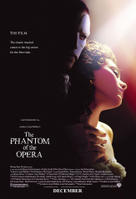Phantom of the Opera
 Director: Joel Schumacher
Director: Joel SchumacherMain Cast: Gerard Butler, Emmy Rossum, Patrick Wilson, Minnie Driver
Writer(s): Joel Schumacher & Andrew Lloyd Weber
Director of Photography: John Mathieson
Producer: Andrew Lloyd Weber
Editor(s): Terry Rawlings
Original Score: Andrew Lloyd Weber
Release Date: December 22, 2004
The film was undeniably high-caliber. The casting was right on the money, except perhaps for Phantom who had the look, but whose voice lacked some of the intoxicating depth that was present with others I have heard perform the part. Christine, Raoul, and Carlotta (a surprising Minnie Driver) were all wonderful in their performances. The sets were perhaps some of the best I have seen, ever. Highly detailed, appropriately ostentatious, brilliant and dark, ornate and subtle, in a word: spectacular. The costumes left little to be desired, as well. Each dress and suit seemed beautifully made and contributed to the overall feel of the film. The lighting and blocking of the actors reminded me of circa 1950's films, particularly the long shots of Christine. Soft lighting, dramatic poses lent an ethereal quality to her character. Transformations between time periods and dream sequence special effects were well put together and were a step above what could be done in live theater. Overall the production quality of the entire picture was very good.
The film, however, lacked the emotion that I experienced when watching the live performance. Perhaps my expectations were set too high, but the lack of ambient sounds during the pre-recorded singing, the sometimes obvious lip-synching during the more powerful performances often made me feel as though the actors were simply standing there staring at each other lovingly with their mouths hanging open. The music, as Weber always is, was fantastic and even most of the performances quite good. It was the disconnectedness between the breathtaking visuals and the orchestration the left me feeling empty, hollow, as though I was watching a beautiful silent film and listening to a great CD at the same time.
Also, the use of the camera did not pace well with the music or the story. Here the cinematographer, or maybe the director, I believe missed the mark greatly on how the use of the forceful eye of the camera could have made the story more amazing, rather than less. And when I say forceful eye, that is exactly what I mean. Watching the performance live means you are free to focus on whatever action you like that is shown on the stage. In the film, however, you are strong-armed into watching whatever the director or editor felt was most important at the time. This came off feeling deliberate and uncomfortable, particularly during the fast moving scenes. And while over-acting and melodrama is often appropriate to communicate the story onstage and even seems quite natural, it does not play well on the big screen where close-ups and long shots dominate.
The heart-wrenching story is what drives this movie more than anything. While it doesn't end quite like you may expect, a tough thing for most American moviegoers to handle, there are some deeply moving moments. Christine is forever indebted to Phantom for his brilliant tutelage, yet we find out that Christine has also shown the Phantom a measure of unconditional love on a couple of occasions that he may feel indebted to repay in some way. Despite the Phantom's obvious manipulations and violent tendencies Christine genuinely cares for him, perhaps even loves him, though it seems more a pitiful love than one truly wrought from ideas of romanticism or friendship. Their relationship is reminiscent of Quasimoto and Esmerelda from Hunchback of Notre Dame. The audience will not tolerate them being together, but on the same token cannot bear their unblemished heroine being cruel to even the most vile creatures. Pity is the only logical outcome to the situation. Raoul, as pitiful as he himself is at times, is expertly placed waiting in the wings to capture her passions so as to not disappoint.
The film left me mostly unaffected. The filmmaking, in my opinion, got in the way of the story telling. But there were some amazing moments, such as the masquerade ball and the opening auction scene. Weber doesn't let you escape his powerful music and while it sometimes lacks the significance it should have, it does not leave you feeling wholly unsatisfied.
Bottom Line: This was a film with beautiful sets, costumes, and one, generally, well cast. The move to the film medium was not expertly executed (not quite the normal Schumacher train wreck, but not without fault either) and leaves the audience feeling empty and disconnected from the normally emotional and monumentally moving story.
A disengaged, 7 out of 10
~RG




2 Comments:
I am learning a lot about film while reading your blog. I will have to go back and watch for the things you mentioned. I do now recall the absense of background noise in the roof top scene, but I was unable to recognize the fact over the popping sound in Harkin's speakers. I therefore assumed that any poor sound quality or lack of audio and visual coordination was due to the poor equipment owned by the theater. Note: Power & Baseline Harkins is rough on the sound.
I have become severely disillusioned with Harkins theaters. I've had too many bad experiences. I do like AMC (Mesa Grand) and the Wallace theater in Gilbert is also quite good.
Thanks for the comments.
~RG
Post a Comment
<< Home